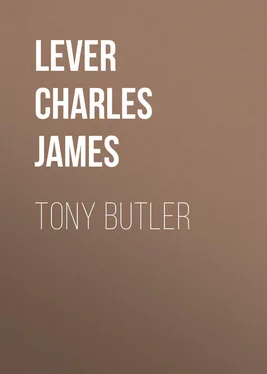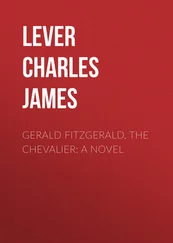Charles Lever - Tony Butler
Здесь есть возможность читать онлайн «Charles Lever - Tony Butler» — ознакомительный отрывок электронной книги совершенно бесплатно, а после прочтения отрывка купить полную версию. В некоторых случаях можно слушать аудио, скачать через торрент в формате fb2 и присутствует краткое содержание. Жанр: literature_19, foreign_antique, foreign_prose, на английском языке. Описание произведения, (предисловие) а так же отзывы посетителей доступны на портале библиотеки ЛибКат.
- Название:Tony Butler
- Автор:
- Жанр:
- Год:неизвестен
- ISBN:нет данных
- Рейтинг книги:3 / 5. Голосов: 1
-
Избранное:Добавить в избранное
- Отзывы:
-
Ваша оценка:
- 60
- 1
- 2
- 3
- 4
- 5
Tony Butler: краткое содержание, описание и аннотация
Предлагаем к чтению аннотацию, описание, краткое содержание или предисловие (зависит от того, что написал сам автор книги «Tony Butler»). Если вы не нашли необходимую информацию о книге — напишите в комментариях, мы постараемся отыскать её.
Tony Butler — читать онлайн ознакомительный отрывок
Ниже представлен текст книги, разбитый по страницам. Система сохранения места последней прочитанной страницы, позволяет с удобством читать онлайн бесплатно книгу «Tony Butler», без необходимости каждый раз заново искать на чём Вы остановились. Поставьте закладку, и сможете в любой момент перейти на страницу, на которой закончили чтение.
Интервал:
Закладка:
“Who are we, – who are we?” said the Chief, in a horror at the query. “Will you tell him, Mr. Brand?”
The other was, however, ringing violently at the bell, and did not hear the question.
“Have you sent to Scotland Yard?” asked he of the servant who came to his summons. “Tell Willis to be ready to accompany the officer, and make his charge.”
“The gentleman asks who we are!” said Baynes, with a feeble laugh.
“I ask in no sort of disrespect to you,” said Butler, “but simply to learn in what capacity I am to regard you. Are you magistrates? Is this a court?”
“No, sir, we are not magistrates,” said Brand; “we are heads of departments, – departments which we shall take care do not include within their limits persons of your habits and pursuits.”
“You can know very little about my habits or pursuits. I promised your hall-porter I ‘d kick him, and I don’t suspect that either you or your little friend there would risk any interference to protect him.”
“My Lord!” said a messenger, in a voice of almost tremulous terror, while he flung open both inner and outer door for the great man’s approach. The person who entered with a quick, active step was an elderly man, white-whiskered and white-haired, but his figure well set up, and his hat rakishly placed a very little on one side; his features were acute, and betokened promptitude and decision, blended with a sort of jocular humor about the mouth, as though even State affairs did not entirely indispose a man to a jest.
“Don’t send that bag off to-night, Baynes, till I come down,” said he, hurriedly; “and if any telegrams arrive, send them over to the house. What’s this policeman doing at the door? – who is refractory?”
“This – young man” – he paused, for he had almost said “gentleman” – “has just threatened an old and respectable servant of the office with a personal chastisement, my Lord.”
“Declared he ‘d break every bone in his body,” chimed in Brand.
“Whose body?” asked his Lordship.
“Willis’s, my Lord, – the hall-porter, – a man, if I mistake not, appointed by your Lordship.”
“I said I ‘d kick him,” said Tony, calmly.
“Kick Willis?” said my Lord, with a forced gravity, which could not, however, suppress a laughing twinkle of his keen gray eyes, – “kick Willis?”
“Yes, my Lord; he does not attempt to deny it.”
“What’s your name, sir,” asked my Lord.
“Butler,” was the brief reply.
“The son of – no, not son – but relative of Sir Omerod’s?” asked his Lordship again.
“His nephew.”
“Why, Sir Harry Elphinstone has asked me for something for you. I don’t see what I can do for you. It would be an admirable thing to have some one to kick the porters; but we have n’t thought of such an appointment, – eh, Baynes? Willis, the very first; most impudent dog! We want a messenger for Bucharest, Brand, don’t we?”
“No, my Lord; you filled it this morning, – gave it to Mr. Beed.”
“Cancel Beed, then, and appoint Butler.”
“Mr. Beed has gone, my Lord, – started with the Vienna bag.”
“Make Butler supernumerary.”
“There are four already, my Lord.”
“I don’t care if there were forty, Mr. Brand! Go and pass your examination, young gentleman, and thank Sir Harry Elphinstone, for this nomination is at his request. I am only sorry you didn’t kick Willis.” And with this parting speech he turned away, and hopped downstairs to his brougham, with the light step and jaunty air of a man of thirty.
Scarcely was the door closed, when Baynes and Brand retired into a window recess, conversing in lowest whispers and with much head-shaking. To what a frightful condition the country must come – any country must come – when administered by men of such levity, who make a sport of its interests, and a practical joke of its patronage – was the theme over which they now mourned in common.
“Are you going to make a minute of this appointment, Brand?” asked Baynes. “I declare I ‘d not do it.”
The other pursed up his lips and leaned his head to one side, as though to imply that such a course would be a bold one.
“Will you put his name on your list?”
“I don’t know,” muttered the other. “I suspect we can do it better. Where have you been educated, Mr. Butler?”
“At home, principally.”
“Never at any public school?”
“Never, except you call a village school a public one.”
Brand’s eyes glistened, and Baynes’s returned the sparkle.
“Are you a proficient in French?”
“Far from it. I could spell out a fable, or a page of ‘Telemachus,’ and even that would push me hard.”
“Do you write a good hand?”
“It is legible, but it’s no beauty.”
“And your arithmetic?”
“Pretty much like my French, – the less said about it the better.”
“I think that will do, Brand,” whispered Baynes.
The other nodded, and muttered, “Of course; and it is the best way to do it.”
“These are the points, Mr. Butler,” he continued, giving him a printed paper, “on which you will have to satisfy the Civil Service Commissioners; they are, as you see, not very numerous nor very difficult. A certificate as to general conduct and character – British subject – some knowledge of foreign languages – the first four rules of arithmetic – and that you are able to ride – ”
“Thank Heaven, there is one thing I can do; and if you ask the Commissioners to take a cast ‘cross country, I ‘ll promise them a breather.”
Tony never noticed – nor, had he noticed, had he cared for – the grave austerity of the heads of departments at this outburst of enthusiasm. He was too full of his own happiness, and too eager to share it with his mother.
As he gained the street, Skeffington passed his arm through his, and walked along with him, offering him his cordial gratulations, and giving him many wise and prudent counsels, though unfortunately, from the state of ignorance of Tony’s mind, these latter were lamentably unprofitable. It was of “the Office” that he warned him, – of its tempers, its caprices, its rancors, and its jealousies, till, lost in the maze of his confusion, poor Tony began to regard it as a beast of ill-omened and savage passions, – a great monster, in fact, who lived on the bones and flesh of ardent and high-hearted youths, drying up the springs of their existence, and exhausting their brains out of mere malevolence. Out of all the farrago that he listened to, all that he could collect was, “that he was one of those fellows that the chiefs always hated and invariably crushed.” Why destiny should have marked him out for such odium – why he was born to be strangled by red tape, Tony could not guess, nor, to say truth, did he trouble himself to inquire; but, resisting a pressing invitation to dine with Skeffington at his club, he hastened to his room to write his good news to his mother.
“Think of my good fortune, dearest little mother,” he wrote. “I have got a place, and such a place! You ‘d fancy it was made for me, for I have neither to talk nor to think nor to read nor to write, – all my requirements are joints that will bear bumping, and a head that will stand the racket of railroad and steamboat without any sense of confusion, beyond what nature implanted there. Was he not a wise Minister who named me to a post where bones are better than brains, and a good digestion superior to intellect? I am to be a messenger, – a Foreign Service Messenger is the grand title, – a creature to go over the whole globe with a white leather bag or two, full of mischief or gossip, as it may be, and whose whole care is to consist in keeping his time, and beins never out of health.
Читать дальшеИнтервал:
Закладка:
Похожие книги на «Tony Butler»
Представляем Вашему вниманию похожие книги на «Tony Butler» списком для выбора. Мы отобрали схожую по названию и смыслу литературу в надежде предоставить читателям больше вариантов отыскать новые, интересные, ещё непрочитанные произведения.
Обсуждение, отзывы о книге «Tony Butler» и просто собственные мнения читателей. Оставьте ваши комментарии, напишите, что Вы думаете о произведении, его смысле или главных героях. Укажите что конкретно понравилось, а что нет, и почему Вы так считаете.












